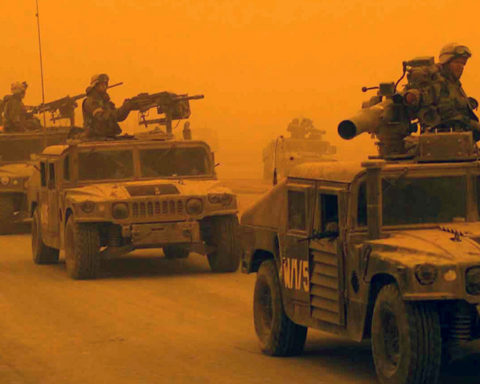Here’s why the experts keep getting us into unwinnable wars like Afghanistan.
by Mattathias Schwartz
One autumn afternoon a few years ago, I took the subway from my Brooklyn apartment to a mansion on the Upper East Side. I was nervous. I had never met President Obama before, and it wasn’t clear to me why I’d been selected to meet with his National Security Council and brief him on the situation unfolding in Iraq. I had no special knowledge of the country. All I knew was what I had been given in my prepared materials. ISIS forces, represented by a bright-red arrow, were making a push toward Baghdad, sending in suicide bombers and threatening the US Embassy. Iraq’s prime minister was asking Obama to reinsert American troops into an active ground war.
When I arrived at the mansion, of course, I didn’t brief the real Obama. Playing the role of the president that day was Max Boot, a seasoned think-tank veteran who, like almost every other self-appointed member of America’s foreign-policy elite, had championed the invasions of both Iraq and Afghanistan. The scenario was an exercise, part of a conference I attended as a newly appointed associate at a leading think tank. As the word “exercise” implies, it was a game, but a serious one, part of a larger campaign by the foreign-policy leaders of the reigning generation to indoctrinate their successors. Over the next several years, I would attend events hosted by the Aspen Institute, the New America Foundation, the Hudson Institute, the Atlantic Council, the Council on Foreign Relations, and the Brookings Institution, among others. I had a formal luncheon with a Middle Eastern ambassador, a buffet breakfast with Thomas Friedman, and a guided tour of an Ohio-class nuclear submarine. At a conference table inside the headquarters of SEAL Team 6, I was told that SEAL Team 6 did not exist. I flew over the White Sands Missile Range in a Black Hawk helicopter, where I did my part for civilian-military relations by vomiting all over the seats and floor.
What I didn’t do was actually go to Iraq or Afghanistan. Instead, I ate free buffet lunches, collected business cards, and mainlined off-the-record propaganda that both of America’s long-running wars were worthy undertakings, steered by capable hands. Much of what we did included participation by the military, but that didn’t strike any of us as odd. In fact, the uniforms and armaments are what made the whole thing seem real, something more than a bunch of kids in suits and ties playing Model United Nations. We weren’t just drafting foreign-policy resolutions; we were helping guide our country to a better understanding of whom to kill, and how to kill them.
Despite its concerted effort to keep Biden in Afghanistan, the Blob lost. It had issued a public veto, and the president had gone ahead and overridden it. Control of the White House national security apparatus is the Blob’s core product. This was like Apple losing the rights to the iPhone.
mattathias schwartz in the Insider







